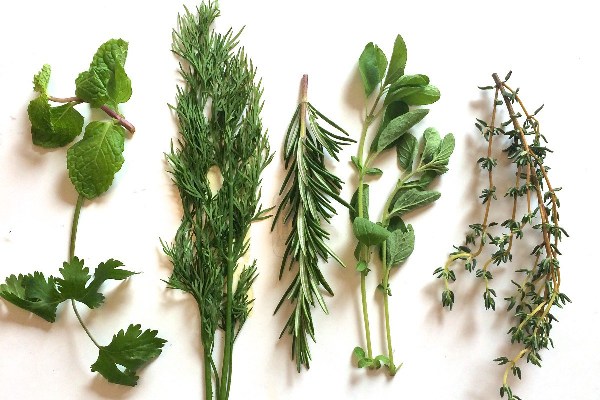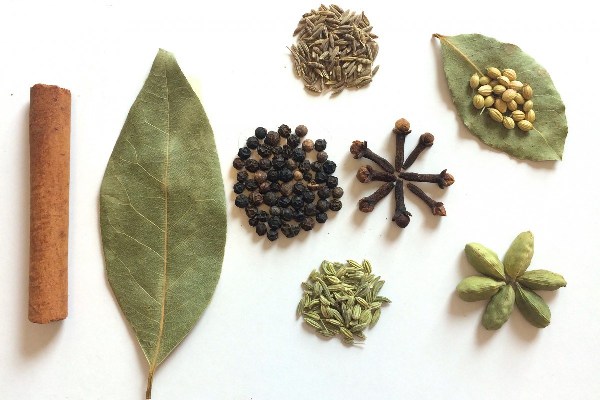
The magic of carminative spices is that they relieve flatulence from the body—shifting the energy from dis-ease to ease.
Ironically they are also some of the most aromatic spices or herbs you will find in your local market. Carminative spices entice the appetite, activate digestion and release feel-good emotions all because they smell so good! Spices like cardamom, ginger, rosemary, basil and mint activate the sense of smell while making food taste extra delicious. More importantly, these magic herbs can help prevent diseases that begin with indigestion.
Both cooling and warming carminatives move excess vata, which is comprised of the element of ether and air, out from the body. In encouraging vata, or air, to flow, carminative spices help prevent stagnation in the gut, allowing our digestive fire (agni) to kindle. Like a gentle breeze that provides just the right of amount of oxygen to maintain a nice campfire, carminative spices work in the same way. They support our digestive fire (agni) by balancing the vata dosha that lives within all of us. In doing so, these spices help food to digest. Think of them as a natural digestive aide.
In creating a smooth pathway, carminative spices also allow prana (our breath, put very simply) to flow. Helping to prevent mental and emotional vata imbalances such as nervousness and anxiety. For example, when there is no stagnation in the gut, the benefits from a deep breath or even just a normal breath are more impactful, as there are no roadblocks preventing prana or life-force from reaching all of our cells. The nourishment from prana, per the wisdom of Ayurveda and Yoga, is integral to our overall well-being.
Scientific research continues to show the health of our gut is essential in supporting the health of our mind. With Ayurveda, this has always been the case—not only does the gut support the mind, but the mind also supports the gut. The mind, body and soul are intertwined, and all three are taken into consideration when defining a healthy balance.
Recall a time when you were feeling bloated or in pain because your body couldn’t release excess gas. How did it make you feel? When you were able to release it, how did you feel? Was there a difference in your thoughts or in your mood? Imagine if you could prevent flatulence from occurring. How would that impact you? What about if you were able to enjoy foods that you normally avoid because you are left feeling bloated or gassy?
Including a combination of warm and cooling carminative spices in your meals will help to prevent bloating, relieve gas and prevent many diseases that begin with recurring indigestion. Balanced food helps you balance. The best part is that foods look prettier, taste richer, and smell better with carminative spices. Plus, carminative spices come with an array of vitamins and minerals. Let food be your medicine—no more antacids, no more spending money on supplements. Good digestion equals better absorption equals better health.
For your next meal, spice it up with carminative* spices. Happy eating!

Carminative spices:
Move Vata
Relieve gas or flatulence
End to be aromatic
Are tasty!
Can be cooling and heating (see list below)
Can be drying (in excess may aggravate vata if using only cooling spices)
Reduce kapha since they tend to be drying
Are mostly pungent in taste
Help maintain balance and can prevent diseases that arise from indigestion
A short list of heating carminatives:
Asafoetida (Hing)
Basil
Bay Leaves
Cardamom
Cinnamon
Cloves
Garlic
Ginger
Nutmeg
Orange peel
Oregano
Rosemary
Thyme
Turmeric
Valerian
A short list of cooling carminatives:
Chamomile
Catnip
Chrysanthemum
Coriander
Cumin
Dill
Fennel
Lime
Musta
Peppermint
Spearmint
*Taking spices/herbs medicinally versus cooking with them are two different things. In Ayurveda, a single herb/spice is rarely prescribed. They are always combined for balance. Consult a practitioner versus self-medicating. Instead, opt for increasing the spices/herbs that live in your kitchen pantry. Spice it up using a combination of heating and cooling spices/herbs. Listen to your body.
References:
Frawley, Dr. David and Lad, Dr. Vasant. The Yoga of Herbs. Twin Lakes, Wisconsin; Lotus Press, 2001
Kerala Ayurveda Academy. Lessons 101-109. Foster City, CA, 2009
Author: Rumin Jehangir
Editor: Evan Yerburgh
Photos: Author’s Own


 Share on bsky
Share on bsky




Read 5 comments and reply